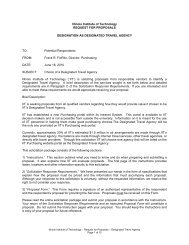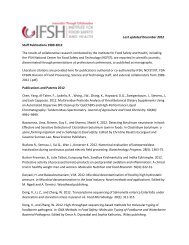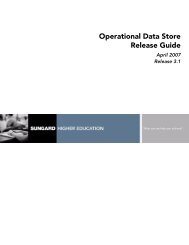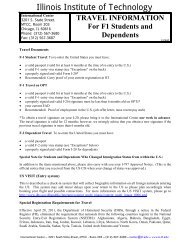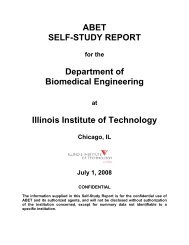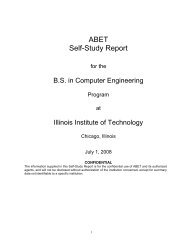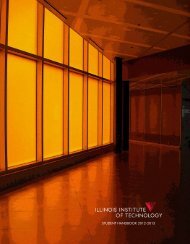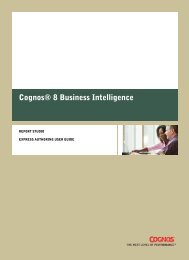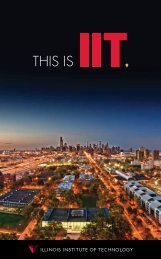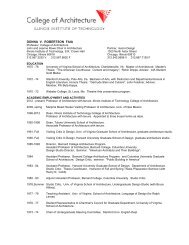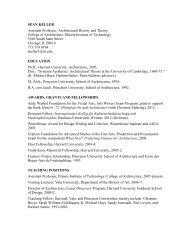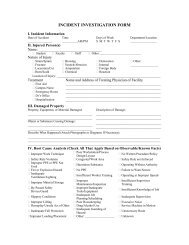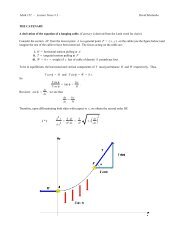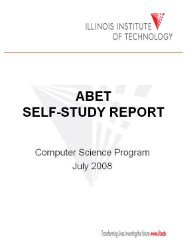Undergraduate Bulletin - Illinois Institute of Technology
Undergraduate Bulletin - Illinois Institute of Technology
Undergraduate Bulletin - Illinois Institute of Technology
You also want an ePaper? Increase the reach of your titles
YUMPU automatically turns print PDFs into web optimized ePapers that Google loves.
Course Descriptions<br />
Political Science<br />
PS 100<br />
Introduction to the Pr<strong>of</strong>ession: Political Science<br />
Intended for first-year political science majors. The course<br />
exposes students to quasi-experimental methods, quantitative<br />
and qualitative approaches, the history <strong>of</strong> the pr<strong>of</strong>ession, and<br />
career possibilities. Students will examine several fundamental<br />
works in the discipline.<br />
(3-0-3) (C)<br />
PS 200<br />
American Government<br />
Surveys American politics and government. Informal political<br />
institutions, such as parties and interest groups, are analyzed<br />
and related to formal governmental institutions, such as the<br />
presidency and the Congress. Emphasis is placed on how the<br />
American political culture shapes these institutions and how<br />
public policies are produced.<br />
(3-0-3) (C)(S)<br />
PS 202<br />
Introduction to Political Science<br />
Introduces students to modern political science covering<br />
American politics, comparative political science, and research<br />
methods.<br />
(3-0-3) (C)(S)<br />
PS 209<br />
Research Methods for Social & Political Science<br />
Introduces students to explanation in the social sciences<br />
and both qualitative and the quantitative research methods.<br />
Topics covered include the formulation <strong>of</strong> research questions,<br />
measurement, data collection, survey research, significance<br />
tests, experimental and quasi-experimental design, sampling,<br />
and various techniques <strong>of</strong> qualitative research. Same as SOC<br />
209.<br />
(3-0-3) (C)(S)<br />
PS 210<br />
Social & Political Thought<br />
Examines central social and political theories and their ideas<br />
concerning such things as the relationship between individual<br />
and society, social harmony and conflict, social equality, and<br />
the role <strong>of</strong> the state. Same as SOC 210.<br />
(3-0-3) (C)(S)<br />
PS 220<br />
Global Chicago<br />
Through readings, lectures, and field trips to local neighborhoods,<br />
this course will look at the ways that Chicago<br />
has become a global city and what that means for local<br />
government, businesses, educators, and the non-pr<strong>of</strong>it sector.<br />
We will explore the extent to which Chicago has become and<br />
continues to be connected to the global economy, its history<br />
as a gateway to immigrants from all over the world, and how<br />
the local non-pr<strong>of</strong>it community is engaged in international<br />
development across the globe. Some key questions we will<br />
study include: In what ways and to what extent is Chicago a<br />
global city? What forces have driven Chicago’s development<br />
as a global city? What are the broad consequences <strong>of</strong> Chicago<br />
being a global city? Same as SOC 220.<br />
(3-0-3) (C)(S)<br />
PS 221<br />
Social Inequality<br />
Evaluates the patterns and dimensions <strong>of</strong> social, economic,<br />
and political inequality in American society and how these<br />
compare with other societies, who gets ahead and why, the<br />
relationship <strong>of</strong> social class to other features <strong>of</strong> society, some<br />
consequences <strong>of</strong> social stratification, and outlooks for the<br />
future <strong>of</strong> inequality in developed countries like the United<br />
States. Formerly known as PS 321. Same as SOC 221.<br />
(3-0-3) (C)(S)<br />
PS 230<br />
International Relations<br />
Examines relations among countries from the perspective<br />
<strong>of</strong> both the international system and the nation-state. Emphasis<br />
is placed on the transformation in the international<br />
system caused by weapons, production, and communication<br />
technologies. Special attention is given to the international<br />
policies <strong>of</strong> the United States toward various regions and its<br />
role in international organizations.<br />
(3-0-3) (C)(S)<br />
PS 232<br />
Introduction to Comparative Politics<br />
Introduces students to the most common theories and<br />
approaches in contemporary comparative political analysis.<br />
Students then employ the tools <strong>of</strong> comparison developed in<br />
an examination <strong>of</strong> the causes and consequences <strong>of</strong> political<br />
instability and conflict and transitions to stable democracy.<br />
(3-0-3) (S)<br />
PS 273<br />
Great Political Thinkers<br />
Introduces students to the ideas <strong>of</strong> the world’s great political<br />
philosophers. Plato, Aristotle, Hobbes, Locke, Rousseau,<br />
Marx, and others will be covered.<br />
(3-0-3) (C)(S)<br />
PS 303<br />
Politics & the Media<br />
Analyzes the media’s role in contemporary American politics<br />
and government. Emphasis is placed on how the media –<br />
newspapers, television, and electronic forms – manufacture<br />
the news and how the news influences political and government<br />
agenda, decision making, and public policies.<br />
Prerequisite(s): [(PS 190-299) OR (SOC 209) OR (SOC 210)<br />
OR (SOC 221)]<br />
(3-0-3) (C)(S)<br />
PS 306<br />
Politics & Public Policy<br />
Analyzes public policy processes with a primary focus on<br />
the United States and a secondary focus on cross-country<br />
comparisons involving the U. S. The overarching concern<br />
is the effectiveness <strong>of</strong> government intervention given our<br />
market-based system. The student will become familiar with<br />
models and determinants <strong>of</strong> policy making. Beyond theories<br />
<strong>of</strong> policy making, the course also surveys a number <strong>of</strong> timely<br />
policy issues. In this way, a balance is reached between<br />
theory and application. There will be an underlying focus on<br />
the American political economy and public policy making,<br />
but students do not need an extensive background in either<br />
economics or policy making.<br />
Prerequisite(s): [(PS 190-299) OR (SOC 209) OR (SOC 210)<br />
OR (SOC 221)]<br />
(3-0-3) (C)(S)<br />
PS 312<br />
Analysis & Evaluation <strong>of</strong> Public Policy<br />
Explores techniques <strong>of</strong> policy analysis and program evaluation<br />
having practical application in such fields as transportation,<br />
education, housing, criminal justice, and environmental<br />
quality. The course includes the research and analytical<br />
methods most frequently applied in governmental decision<br />
making.<br />
Prerequisite(s): [(PS 190-299) OR (SOC 209) OR (SOC 210)<br />
OR (SOC 221)]<br />
(3-0-3) (S)<br />
251



